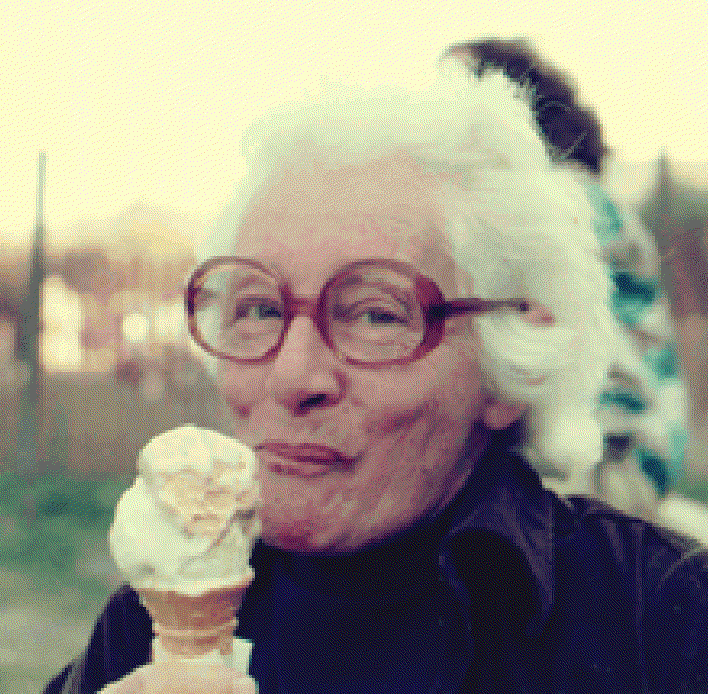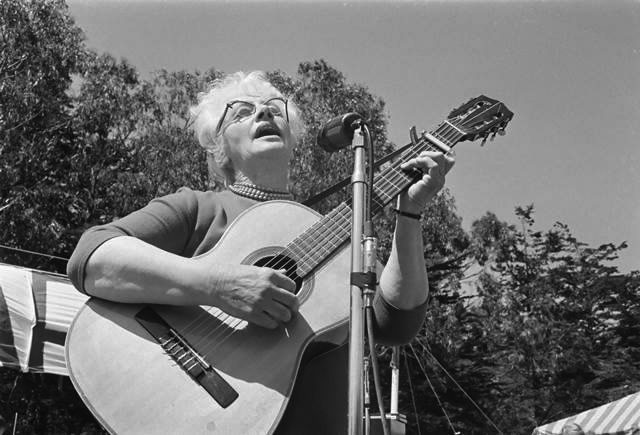Inspiration comes to Malvina Reynolds as she drives through a Daly City housing development in 1962. Her song, “Little Boxes,” a satire on conformity, becomes her most famous tune.
Little boxes on the hillside,
Little boxes made of ticky tacky.
Little boxes on the hillside,
Little boxes all the same.
There’s a pink one and a green one
And a blue one and a yellow one
And they’re all made out of ticky tacky
And they all look just the same.
Born in San Francisco in 1900 to Jewish immigrants, Malvina is denied a diploma from Lowell High School because of her parents’ opposition to American involvement in World War I. But her teachers step in to help her get into college. She plays violin in a dance band and earns her BA and MA in English as well as a doctorate in romance philology from the University of California at Berkeley. Years later, she returns to study music theory.
As a Jewish, socialist woman, Reynolds can’t find a teaching job at the college level during the Great Depression and becomes a social worker. When World War II begins, she takes a job on the assemblyline of a bomb factory.
In the late 1940s, Reynolds lives in the Los Angeles area and works with her husband on progressive political campaigns. She also performs at folk music events. In 1951, Reynolds runs for a council seat in Long Beach but loses the election and returns to Berkeley for good.
Reynolds considers herself shy, but finds an avenue of expression through poetry that she then puts to music. She has been writing songs since the late 1930s but steps up her production in the 1950s adding children’s songs to her repertoire creating an extensive body of work.
Her activism in civil rights, opposition to the Vietnam War, and support of workers’ rights, bring her songs to the fore in the 1960s and are recorded by Pete Seeger, Joan Baez, and Harry Belafonte, among others.
Seeger says Reynolds is “one of the greatest songwriters of the 20th Century.”

Some of songs most closely associated with Seeger, including Little Boxes, are either compositions or collaborations with Reynolds. She writes God Bless the Grass. Seeger puts the music to Seventy Miles, a musing on the environmental degradation of San Francisco Bay, and From Way Up Here, a wistful rumination on the human condition.
At age 59, Reynolds records her first album and goes on to record several albums of folk songs and three albums of music for children.
In 1965, Reynolds is featured on an episode of “Rainbow Quest,” a short-lived television series hosted by Seeger devoted to traditional folk, old-time, bluegrass and blues music.
When Seeger comments that she seems to write a song every day before breakfast, Reynolds responds:
“The only time I write a song is when something bugs me, and that’s often enough.”
She performs four originals on the show, including No Hole in My Head and The Little Red Hen, both a musical rendition of the classic children’s fable and a statement on socialism.
She is still performing at the time of her death on March 17, 1978. The Children’s Music Network annually issues “The Magic Penny Award,” named for Reynolds’ song Magic Penny, in recognition of her contribution to the genre.
Love is something if you give it away,
Give it away, give it away.
Love is something if you give it away,
You end up having more.
It’s just like a magic penny,
Hold it tight and you won’t have any.
Lend it, spend it, and you’ll have so many
They’ll roll all over the floor.
In 2017 ,Reynolds posthumously receives the Folk Alliance International Legacy Lifetime Achievement Award, presented every year to honor the ongoing cultural impact of legendary folk music figures.
